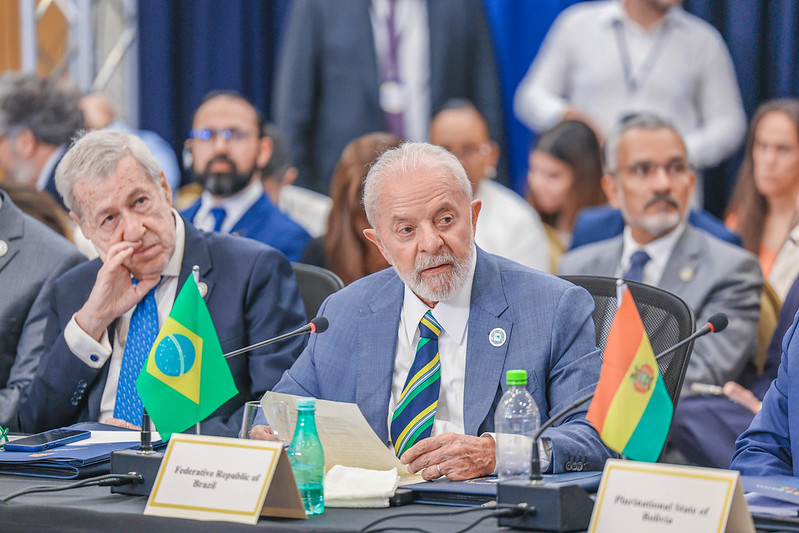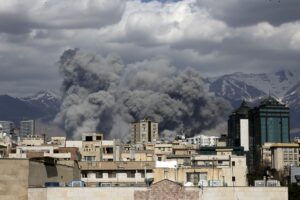
This Friday (1), President Lula participates in the 8th Summit of Heads of State and Government of the Community of Latin American and Caribbean States – CELAC. At the event, which takes place in Kingstown, capital of Saint Vincent and the Grenadines, the president drew attention in his speech to the humanitarian tragedy in Gaza.
Lula called for an end to Israel’s attacks, recalled that people die in queues for food and criticized the indifference of the international community, which he classified as “shocking”. The call for a ceasefire was also punctuated by the indication that there are already over 30,000 Palestinian deaths, in addition to noting that the lives of hostages held by Hamas are at stake.
At the event, which was attended by the UN Secretary-General, António Guterres, the Brazilian leader also proposed a motion within the scope of CELAC calling for an end to the “genocide” in Gaza and urged the United Nations leader to invoke Article 99 of the UN Charter “to bring the attention of the Council [de Segurança] issue that threatens international peace and security”.
The situation in Ukraine and Haiti was also highlighted with concern. Regarding Cuba, Lula defended the end of the economic blockade. As for Argentina, he spoke of sovereignty in the Falklands.
When speaking about the context in which Latin America and the Caribbean are inserted, Lula spoke on behalf of everyone as host of the G20 and COP30 summits by pointing out that the region has the opportunity to influence global debates.
In this sense, he highlighted the proposal made by the Global Alliance against Hunger and Poverty since “of the 660 million Latin Americans and Caribbean people, there are still 180 million people who do not have enough income to meet their basic needs and 70 million still go hunger”.
Throughout the day, President Lula still has meetings about the situation in Gaza with the President of Colombia, Gustavo Petro, the Minister of Foreign Affairs of Chile, Alberto van Klaveren, and the Secretary of Foreign Affairs of Mexico, Alicia Bárcena. He then participates in bilateral meetings with the president of Venezuela, Nicolás Maduro, with the president of Bolivia, Luis Arce, as well as a meeting with the Secretary-General of the United Nations, António Guterres, among other CELAC events.
It is great to come to Saint Vincent and the Grenadines to participate in the eighth CELAC Summit.
This beautiful and welcoming Caribbean country today welcomes the leaders responsible for making our integration ideals a reality.
One of the most rewarding experiences of my first mandates is related to the revival of the integrationist project in the first decade of the 21st century.
I had the opportunity and satisfaction of living a unique moment of this collective desire for closer ties between us.
We work to strengthen and expand MERCOSUR and for the creation of UNASUR.
I participated in the initial stages of formation of CELAC in 2008, in Bahia, when we brought together, for the first time, the 33 heads of State and Government from Latin America and the Caribbean.
It took 500 years for this to happen.
Despite our diversity, we were able to move forward with firm steps towards building regional consensus.
Our extraordinary cultural, ethnic and geographic variety was not an obstacle.
Our different political and economic models have not impeded the permanent effort for understanding.
We had to unite with common desires for social justice, combating poverty and promoting development.
We build a culture of peace and understanding.
In recent years, however, we have returned to being a balkanized and divided region, more outward-looking than inward-looking.
Among many of us, intolerance has gained strength and is preventing different points of view from being able to sit at the same table.
We are failing to cultivate our vocation of cooperation and allowing conflicts and disputes, many of them foreign to the region, to prevail.
Defending the end of the blockade of Cuba and Argentine sovereignty in the Falklands is of interest to all of us.
All forms of unilateral sanctions, without support from International Law, are counterproductive and penalize the most vulnerable.
At a time when global military spending exceeds 2 trillion dollars per year, recovering the spirit of solidarity, dialogue and cooperation could not be more timely and necessary.
In a world where so many conflicts victimize thousands of innocent people, especially women and children, our region must be an example of peacebuilding.
Ladies and gentlemen,
We cannot help but reflect on our place on an international level.
In a context of diffusion of global power and constant reinforcement of multipolarity, the question that arises again is whether the countries of Latin America and the Caribbean want to integrate into the world united or separately.
This is particularly relevant at the current time, when our region will become the center of gravity of global diplomacy, hosting the G20, APEC, BRICS and COP30 summits.
If we speak as a region, we have a better chance of influencing today’s major debates.
If we work together, we create synergies that strengthen our individual development projects.
The three priorities of the Brazilian presidency of the G20 are very much in line with our historical challenges.
Our proposal for the Global Alliance against Hunger and Poverty can benefit from CELAC’s Food Security and Poverty Eradication Plan.
According to CEPAL, of the 660 million Latin Americans and Caribbean people, there are still 180 million people who do not have enough income to meet their basic needs and 70 million still go hungry.
This is a paradox for a region that is home to large and diverse food providers.
Sustainable development and the energy transition are an urgency of our time and an opportunity for all of us.
We have the greatest renewable energy potential in the world, if we take into account the capacity to produce biofuels, wind, solar energy and green hydrogen.
We have more than 1/3 of the planet’s water reserves and a very rich biodiversity.
Our soil contains a vast and diverse set of strategic minerals of great importance for cutting-edge industrial projects.
In this year in which we celebrate the 60th anniversary of the United Nations Conference on Trade and Development (UNCTAD), it is worth resuming the debate on the structural nature of underdevelopment.
Economists such as Raul Prebisch and Celso Furtado explained the risks associated with an international insertion based solely on comparative advantages.
With integration, we can work to ensure that Artificial Intelligence tools are an ally in our reindustrialization projects, mitigating their harmful effects on the job market.
The IMF estimates that 40% of jobs in the world will be negatively affected by these new technologies.
The necessary reforms of international organizations include the demand for innovative financing mechanisms.
Multilateral development banks must allocate more resources, more quickly and without conditionality, to initiatives that really make a difference.
This will make it easier to face our poor physical connection and invest in the construction of roads, railways, bridges, ports and air connections that allow for the effective movement of people and goods.
Ladies and gentlemen,
I thank comrade Ralph Gonsalves, once again, for the exceptional work carried out during his presidency.
I am sure that my companion Xiomara Castro will have the same success in leading CELAC.
Brazil believes in CELAC as a forum for building consensus, which cultivates the path of understanding and which does not allow itself to be tempted by imposing solutions.
I want to conclude by paraphrasing Ambassador Samuel Pinheiro Guimarães, a great defender of the regional aspect of Brazilian foreign policy and who recently left us.
To achieve their strategic development objectives, states on the periphery of the capitalist world need to see each other through their own eyes and not through the prism of central countries.
CELAC provides us with the possibility of thinking about our insertion in the world based on our agendas and interests.
My friends and my friends,
In Ukraine, every day that fighting continues, human suffering, loss of life and destruction of homes increase.
In Haiti, we need to act quickly to alleviate the suffering of a population torn apart by social chaos. For years, Brazil has been saying that Haiti’s problem is not just one of security, but, above all, of development.
The humanitarian tragedy in Gaza requires all of us to be able to say enough is enough to the collective punishment that the Israeli government imposes on the Palestinian people.
People are dying in line to get food.
The indifference of the international community is shocking.
I want to take advantage of the presence of the UN Secretary General, my companion António Guterres, to propose a CELAC motion for an immediate end to this genocide.
The Secretary-General may invoke Article 99 of the UN Charter to bring to the Council’s attention an issue that threatens international peace and security.
I appeal to the Japanese government, which assumes the presidency of the Council from today, to address this issue with all urgency.
I call on the five permanent members of the UN Security Council to put aside their differences and put an end to this killing.
There are already more than 30 thousand dead. The lives of thousands of innocent women and children are at stake.
The lives of Hamas hostages are also at stake.
I want to finish by telling you that our dignity and humanity are at stake. That is why it is necessary to stop the carnage in the name of the survival of humanity, which needs a lot of humanism.
Thank you very much.
Watch how the statement went:
Source: vermelho.org.br

